On July 4, 2019, British forces detained an Iranian oil tanker in Gibraltar. On July 19, commando forces of Iran's Islamic Revolutionary Guards Corps (IRGC) had seized an empty British-flagged oil tanker, the Stena Impero, which was en route from the UAE port of Fujairah to Saudi Arabia. Iranian spokesmen from across the Iranian political spectrum expressed pride in the seizure of the vessel and praised the IRGC for its anti-British operation.
Following these tanker incidents, Iranian spokesmen are reiterating the position that the regime has maintained for years: that the Persian Gulf is Iranian sovereign territory, that Iran is responsible for the Strait of Hormuz, and that IRGC forces are carrying out legitimate and legal policing activity in them, to ensure shipping security and to protect Iran's borders. The pragmatic daily Ebtekar, which supports the government of Iranian President Hassan Rohani, further emphasized that the Strait of Hormuz is Iranian sovereign territory.
This view was demonstrated on December 4, 2019, when the USS Abraham Lincoln was escorted out of the Persian Gulf by speedboats belonging to Iran's Islamic Revolutionary Guard Corps (IRGC). The incident was reported by the "Instakhabari" Instagram account, which appears to be affiliated with the IRGC, on December 8, and two days later the report was picked up by the IRGC-affiliated Iranian news agency Mashregh. The report stated: "Controlling and securing the Strait of Hormuz is the main mission of the Iranian navy. This is carried out via an international station, where all vessels crossing the strait must present themselves to Iranian forces and report their locations. Here are [two] satellite photos taken December 4, 2019 showing the American aircraft carrier Abraham Lincoln and the vessels escorting it quietly leaving the Persian Gulf, surrounded by Iranian speedboats."

Iranian regime officials have provided various reasons for the detention of the British tanker: violating Persian Gulf shipping regulations by entering via the exit lane, colliding with a fishing vessel, and turning off its navigation systems. All are derived from the regime's position that IRGC forces are carrying out legitimate and legal policing in the Gulf, since it is Iranian sovereign territory and/or under Iranian responsibility.
This Iranian position was explicitly reiterated as early as February 2019, by IRGC Navy commander Gen. Alireza Tangsiri (see Appendix) and was emphasized further when it was expressed by President Rohani in a conversation with Omani Foreign Minister Yusuf bin Alawi, as Oman is a local ally of Iran. He also said it in statements to French President Emmanuel Macron in an attempt to preempt the establishment of a European naval police force. President Rohani said in his July 28 Tehran meeting with Foreign Minister bin Alawi: "Iran and Oman bear on their shoulders most of the responsibility for providing security in the Strait of Hormuz. Not only does the presence of foreign forces not help security in the region, it actually is the main cause of tension in the region."[1] On July 30, Rohani said in a phone conversation with President Macron: "Iran always was and always will be the main provider of security and shipping freedom in the Persian Gulf, the Strait of Hormuz, and the Gulf of Oman."[2]
It should be noted that along with stressing this principled position, senior regime spokesmen also emphasize their right to retaliation and reprisal operations in order to deter the West from "piracy" directed against Iran. For more on these threats to act against Britain, see MEMRI Special Dispatch No, 8183, Senior Iranian Officials Threaten Britain With Retaliation For Its Seizure Of Iranian Tanker, Warn Europe Its Security Is At Risk If It Won't Meet Its JCPOA Obligations, July 19, 2019.
This paper will review Iranian regime officials' statements expressing the regime's position that it protects the Persian Gulf and Strait of Hormuz, along with their acknowledgements that the seizure of the British tanker was retaliatory, explaining that it is based in international law. The Appendix presents February 2019 statements by IRGC Navy commander Gen. Tangsiri, previously translated and published by MEMRI.
Iran's Position: The Persian Gulf Is Iranian Territory, And The IRGC Is Carrying Out Legal Policing
Iranian Army Naval Commander Adm. Khanzadi: "The First Law That Applies In This [Persian Gulf] Region Is Iranian Maritime Law – And Only Then International Law"
The position that the Persian Gulf is Iranian territory was expressed clearly by Iranian Army naval commander Adm. Ali Khanzadi in a comprehensive July 21, 2019 interview with the IRGC publication YJC that was published two days later. He said:
"Our regime is a uniform and dynamic regime. And [Iranian Supreme Leader Ali] Khamenei has the last word in all regime operations. Even the united armed forces, thanks to their relationship with Khamenei as commander in chief of the armed forces. Khamenei announced clearly, in accordance with his wise plans, that the young revolutionaries would respond in the maritime area to England's arrogant operation, and we witnessed this command being carried out. Everyone already knows that today the era of bullying and meandering around in the sea is over, and the interests and sovereignty of the nations must be respected. When we talk about any vessel, it is as if it were a piece of the country's land... The Iranians have a nice saying: 'People who live in glass houses shouldn't throw stones at others.' Thus, the English live in a glass house, [and I suggest] that they imagine what would happen if a stone is thrown at this glass house."
Adm. Khanzadi continued: "Iran's armed forces, and all the country's naval forces, are present in the water as a uniform body, and provide perfect security to the maritime areas under Iranian control and also to the seas around these areas, and operate within the legal Iranian and international maritime framework. International maritime law includes a section stating that international maritime laws do not supersede the laws of the littoral countries. Therefore, the first law that applies in this [Persian Gulf] region is Iranian maritime law – and only then international law.
Adm. Khanzadi: "Iran's Armed Forces Are Responsible For Providing Security For The Persian Gulf And The Gulf Of Oman"
"This [British] tanker violated both Iranian maritime law and international maritime law. It entered the Strait of Hormuz in the wrong lane, and turned off its navigation system. There may also have been English military forces on deck, which is banned on commercial vessels, and we are checking that. The IRGC Navy operated very professionally, and in an outstanding manner... Those who are forced to follow international law and maritime regimes [i.e. the West] must be bound by these laws so that others will follow them. If these laws are not followed in the global arena, this will definitely cause unrest that will threaten the interests of all countries."
"Iran's armed forces are responsible for providing security in the Persian Gulf and the Gulf of Oman, and until now they have fulfilled this role in an outstanding manner in the north of these regions. What causes maritime insecurity [in the Persian Gulf and Gulf of Oman] is the two-faced presence of the forces of arrogance – America and England – and those [i.e. the countries that collaborate with the U.S. and Britain] within the coalition. They think more about their profits and about looting the resources of the region's countries than of meeting the interests of the region's countries, and want to increase their arrogant might in the world."
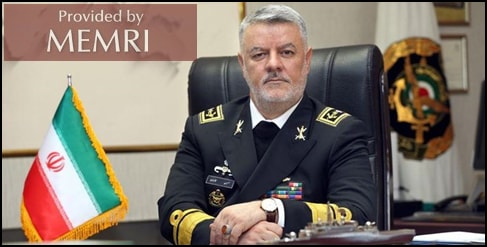
Iranian Army naval commander Hossein Khanzadi (Source: YJC, Iran, July 23, 2019)
Khanzadi: "The Persian Gulf... Is Considered Our Backyard"; We Are Monitoring "The Enemy Navy, Particularly The American Navy, From Its Starting Point Until The Moment It Enters The Region"
"Iran's intelligence control, particularly with regard to the global arrogance [i.e. the U.S.] and the coalition forces, headed by America, is carried out by a uniform system spearheaded by the [Iranian and IRGC] navies. As of today, we can say that we are monitoring, step by step, the enemy navy, particularly the American navy, from its starting point until the moment it enters the region. The knowledge we have about the navy and about its route and when it enters [the region] includes what type of mission [it is on], the quality of its presence, and its naval operations...
"One of the means with good potential on this level is drones. The drones we have today are unlimited in their ability to maintain contact with us, despite their significant range. We have an entire archive of long-distance images of approaches by American vessels. We also have full images and a large archive of every moment of the daily movements of the coalition and American forces. Our drones are monitoring their [commercial] vessels and warships, from the moment they enter the Gulf of Oman and the Persian Gulf, and this monitoring continues as long as they sail around in the Gulf of Oman and the Persian Gulf. Their behavior in the Persian Gulf, which is considered our backyard, takes place entirely under our surveillance, which is carried out while upholding professional principles and international law and aviation law...
"New drones are being added all the time to the navy. One of the new types of drones is a long-range drone... Today the importance of drones has made them a strategic means giving us supremacy, a broader range of vision, and more complete intelligence control. The Iranian and IRGC navies' drone system completely controls the Persian Gulf and Gulf of Oman region. We also have a type of intercontinental drone, and if necessary we will certainly use them. The intercontinental drones can be used also in the Indian Ocean region...
"The good news is that the sea is secure, and we are standing strong in it. The enemy is monitoring us in some of the places [at sea] but there are places [in it] where the enemy cannot monitor us. The enemy will be surprised in that place where it cannot monitor us...
"We are meant to conduct our first joint naval maneuvers. These maneuvers will be the beginning of a naval coalition in the [Indian Ocean] region that ensures security in the region. Therefore, since the beginning of this year we have held meetings with countries friendly [to Iran] in Bandar Abbas [in Iran], and held talks on this matter... Ours is among the most active navies in the Indian Ocean region... A naval coalition with the countries of the region will definitely be established. What this region needs is cooperation in order to achieve security for all. Iran alone is providing the security for the shipping lanes in regions under its control."[3]
Iranian President Rohani: The IRGC Is Responsible For Strait Of Hormuz Security; Iran Has Always Been The Protector Of The Persian Gulf
President Rohani also said, at a July 24, 2019 government meeting, that the IRGC is responsible for security in the international Strait of Hormuz, and that historically Iran has always been the protector of the Persian Gulf: "The Strait of Hormuz is in a very important location, and there is no room for joking there and it is no place for any country to want to ignore the international laws and enter it against traffic while disregarding the warnings of the IRGC, which is responsible for security in the Strait of Hormuz. The main responsibility for protecting the Strait of Hormuz and the Persian Gulf is primarily Iran's and the neighboring countries' and [this responsibility] has nothing to do with other [countries, that is, the U.S., Britain, etc.]. The Iranian nation has always been the protector of the Persian Gulf...
"The IRGC boldly and forcibly detained the criminal British vessel because it did not obey any [of the IRGC soldiers'] orders and warnings. The IRGC carried out a highly professional and correct precision operation, and I believe that the whole world should be grateful to it for the security in the Persian Gulf and the Strait of Hormuz. At the same time, we will allow no one to violate the order in the Persian Gulf and the Strait of Hormuz. Nonetheless, we are not seeking tension and military conflict, and the operations we have carried out so far are in line with [the scope of] the other side's violations. When the infiltrating [U.S.] drone was downed it was a professional precision operation; in the same way, if there are any further infiltrations of our borders we will respond in the same way again."[4]
Foreign Minister Zarif: Iran Ensures The Security Of The Persian Gulf And Strait Of Hormuz; The Persian Gulf Waters Belong To Iran
In several statements following Iran's seizure of the British tanker, Iranian Foreign Minister Javad Zarif stressed that Iran was ensuring the security of the Persian Gulf and the Strait of Hormuz, and that the Persian Gulf belongs to Iran.
On July 22, 2019, Zarif stated: "The British ship had turned down its signal for more time than it was allowed to [and] was passing through the wrong channel, endangering the safety and security of shipping and navigation in the Strait of Hormuz, for which we are responsible."[5]
On July 20 and 23, Zarif reiterated that Iran is ensuring security in the Persian Gulf and Strait of Hormuz, and that the Persian Gulf waters belong to Iran and Iran is protecting them.
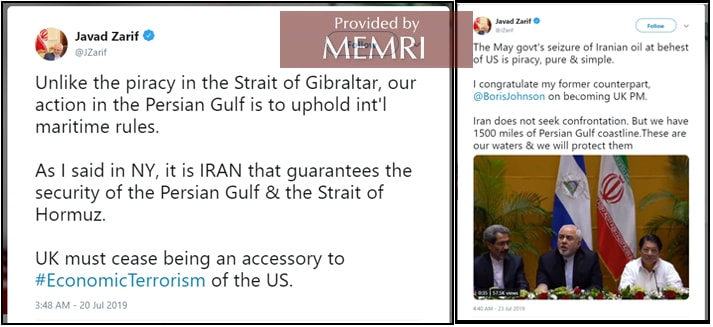
Left: Twitter.com/JZarif/status/1152530835154833408; right: Twitter.com/JZarif/status/1153630882537922560.
Iranian Pragmatic Daily Ebtekar: Iranian Sovereignty In Strait Of Hormuz Is Red Line
The pragmatic Iranian daily Ebtekar stated in a July 31, 2019 article titled "The Red Line in the Strait of Hormuz" that Iran has natural and historic sovereignty over the strait. It wrote: "Despite the Europeans', particularly Britain's, diligence in reducing tensions with Iran, Washington has sneakily changed the playing field into an arena of hostility with Iran. Iran's natural and historic sovereignty over the Strait of Hormuz was exposed to an adventurous and tactical operation. This threat was beyond the sanctions imposed so far by Washington. Iran's sovereignty is the red line. First of all, steps must be taken to neutralize the policy of Washington's establishing a [naval coalition for protecting shipping lane security]. Second, any kind of change in the security deployment in the Strait of Hormuz must be prevented, in order to preserve Iran's sovereignty [there]."[6]
IRGC Spokesman Gen. Ramazan Sharif: "As Representative Of The Iranian People, The IRGC Navy... Is Operating With Determination... To Implement National Control Of The Country's Sea Borders In The Persian Gulf And Strait Of Hormuz"
On July 20, 2019, IRGC spokesman Gen. Ramazan Sharif explained why the British tanker had been detained: "The English tanker Stena Impro, that was accompanied by a British frigate, was stopped at the request of the Hormozgan Province Ports and Vessels Organization by the vessels unit of the IRGC Navy's First Naval Zone, because it entered the Strait of Hormuz in the wrong lane, ignoring international law. It could [also] have collided with other vessels. The English tanker turned off its navigation system, and this is against the law, and instead of advancing to the entrance of the Persian Gulf in the Strait of Hormuz [on the north side], it entered from the exit, from the south [side] of the Strait of Hormuz. The tanker was swiftly and decisively detained by Iranian forces after it disregarded the warnings of the IRGC naval unit. After the tanker resisted, and the English royal frigate, launching two helicopters, interfered and attempted to prevent the IRGC naval commando from carrying out its mission, it was guided to the port for the required legal clarifications and operations.
"The vessel laws' precise protection of every vessel that intends to enter the Persian Gulf and the Strait of Hormuz maintains peace and safety in this strategic region. These laws apply not only to this region but also to the rest of the sea lanes worldwide. [But] naturally the implementation of these laws [in the Persian Gulf] is more important because of the sensitivity caused by the provocative and unprofessional presence of extra-regional forces in this region.
"I am warning about the prideful and provocative behavior of some foreign vessels and also about the disobedience and violation of the international law of the sea. As representatives of the Iranian people, the IRGC Navy, together with the other armed forces, is operating with determination to implement international law, and also to implement national control over the country's sea borders in the Persian Gulf and Strait of Hormuz. They are not allowing the national interests and security of this region, which is an international matter, to be harmed by foreigners' irregular behavior. The English tanker that was detained is currently under the authority of the Hormozgan Province Ports and Vessels Organization, and the stages of the legal handling [of this matter] are being carried out now."[7]
Iranian Ambassador To UK Baeidinejad: The British Tanker Violated Security Regulations In The Strait
The argument that Iran is policing the Strait of Hormuz was supported by Iranian Ambassador to the UK Hamid Baeidinejad. On July 29, he tweeted that it is "impossible to advance" a swap of the British and Iranian tankers because the UK had "illegally detained the ship carrying Iranian oil while the British ship is detained for violating some key safety/security regulations in Hormuz Strait."
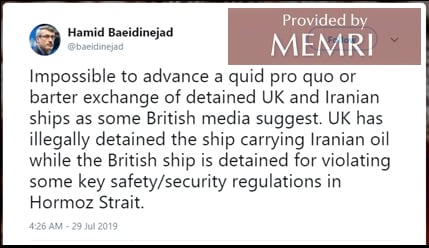
Source: Twitter.com/baeidinejad/status/1155801879827402752
Iranian Vice President Jahangiri: Iran Is The Protector Of Security In The Strait Of Hormuz And Persian Gulf; The British "Have Realized That We Too Know The Language Of Force"
Iranian Vice President Eshaq Jahangiri, a reformist, said, in a similar vein: "They [the British] wanted to use the language of force, but they have realized that we too know the language of force. Iran is the largest state in the Middle East... and Persian Gulf security without it is unimaginable. Iran is the one capable of providing security for the region... Iran is the protector of security in the Strait of Hormuz and the Persian Gulf, and the others must know that arrogance toward Iran will yield no results."[8]
Iranian Spokesmen: "The British Got What They Deserved"
Several Iranian spokesmen stressed that Iran had the right to retaliate against the British:
Majlis Speaker Larijani: "The English Committed Robbery, And Got What They Deserved"
In a July 21, 2019 Majlis session, in response to statements by Majlis member Hossein Ali Hajji Daligani who sought to boast publicly about the IRGC detainment of the British tanker, Majlis speaker Ali Larijani said: "The English committed robbery, and they got what they deserved."[9]
Kayhan Editor Shariatmadari: Iran's Seizure Of The English Tanker Is Our Country's Reprisal And Retaliation
Hossein Shariatmadari, the editor of the regime-affiliated Kayhan daily, wrote in a July 21 op-ed in the paper that it must be publicly acknowledged that Iran's response and its detention of the British tanker were Iran's legitimate reprisal and retaliation against Britain, and in keeping with international law. He wrote:
"Perhaps there are, in the state's upper echelons, some who will consider the content of this article extreme. However, the point of the article is Iran's constitutional right – a right also officially recognized by international law.
" Following the IRGC Navy's detention of the British tanker Stena Impro in the Strait of Hormuz on the evening of July 19, 2019, an official response was issued, as were responses from senior officials in our country, stating: 'This British tanker was detained for violating international maritime law.'
"It was explained that the Stena Impro's three violations were 'moving in the wrong lane in the Strait of Hormuz, turning off its navigation system, and ignoring Iranian warnings.' These explanations, whether we like it or not, may imply... that had the British tanker not committed these three violations, it could have easily passed through the Strait of Hormuz without being detained by the IRGC! In fact, the British tanker's detention was our country's reciprocal response and retaliation, in light of [Britain's] illegal detention of the Iranian tanker in Gibraltar.
"Therefore, even if the British tanker had fully obeyed every international maritime law, word for word, the IRGC Navy would still have had to detain it. When we point to the tanker's three violations of maritime law as the reason for its detention, it is as if we are disregarding and forgetting [our] right to reprisal. Such an approach, like it or not, has the scent of passivity.
"The explanation is as follows: Articles 14 to 23 of the 1958 Geneva Convention and Articles 17 to 23 of the 1982 Jamaica Convention, on 'territorial waters rights and vessels' passage rights' allow Iran to block the Strait of Hormuz to vessels that disregard our country's national interests. England is without a doubt an example of [the implementation of] this law. But in addition to the content of the abovementioned articles, international law formally recognizes the right of every country which has been subjected to hostile operations [to carry out] reprisals or retaliation. Therefore, we can, and we must, say decisively that we detained the English tanker as reprisal and retaliation for England's detention of the Iranian tanker, not because of maritime violations!
"As long as England does not stop its piracy and does not release the Iranian tanker, we will continue to hold the above tanker, and will detain any other English vessel, in accordance with these articles of international law. No need for embarrassment. This is our legal right, and every effort to cover up this action is useless..."[10]
Kayhan Front Page, July 21, 2019: "An Oil Tanker For An Oil Tanker; Iran Has Kept Its Promise"
The July 21, 2019 front page of the regime-affiliated Kayhan was headlined: "An Oil Tanker for An Oil Tanker; Iran Has Kept Its Promise." It went on to state: "The detention of the British oil tanker Stena Impro in the Persian Gulf has shown the pirates of the Queen [of England] that their wickedness will not go unpunished, and London must pay for its anti-Iran operations."
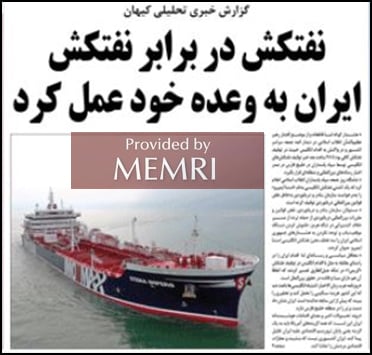
Front page of the Kayhan daily, July 21, 2019.
Majlis National Security Committee Member Javad Karimi Ghoddousi: "We Must Carry Out Reprisals Against Anyone Attacking Our Land And Our Interests"
On July 20, 2019, Majlis National Security and Foreign Policy Committee member Javad Karimi Ghoddousi said: "England's navy detained the Iranian oil tanker which was carrying cargo that is 100% legal. Our diplomats made many efforts to release the tanker before Iran retaliated. But these efforts were in vain, so the sons of the IRGC Navy detained the English tanker yesterday in the Strait of Hormuz, at the request of Iran's Ports and Vessels Organization, and following an ultimatum by [Iranian Supreme Leader Ali] Khamenei stating that there must be a response to the English piracy against Iran. The English tanker was detained by the IRGC Navy for violations of maritime law and for moving violations, and remains in custody on orders of the legal system. This is a clear message to all that Iran is accountable to no one in any matter, and no one can thumb their nose at the Iranian nation and cast doubt on its borders.
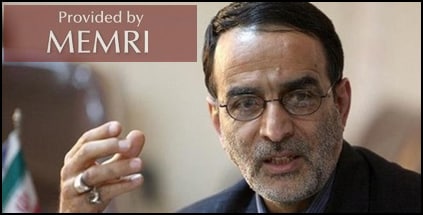
Javad Karimi Ghoddousi (source: Fars, July 20, 2019)
"As our religion dictates, we must carry out reprisals against anyone attacking our land and our interests. [This] attests to the will, determination, strength, and capability of the Iranian nation, the IRGC Navy, and our army in the waters of the Persian Gulf and the Gulf of Oman. The detention of the British oil tanker bears with it a clear message that from now on even the smallest threat to our shipping will provoke our reprisal, and we will even act beyond [the scope of what was done to us]..."[11]
Hashemi Rafsanjani: "England Should Have Gotten A Stronger Response To Its Piracy"
On July 20, Tehran Islamic Council Mohsen Hashemi Rafsanjani, the son of the late Ali Akbar Hashemi Rafsanjani, addressed the issue of the British tanker at the inauguration of a Tehran public park, saying: "With regard to the recent IRGC operation to stop the British oil tanker, we say, 'Good job' to the outstanding IRGC men. England should have gotten a stronger response to its piracy. This IRGC operation conveyed this message to the highest echelons of that country [UK]."[12]
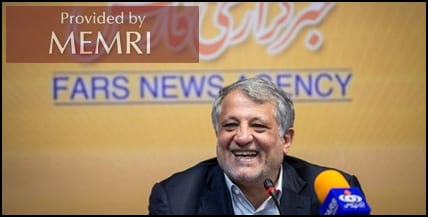
Mohsen Hashemi Rafsanjani (source: Fars, July 20, 2019)
Majlis Iran-England Friendship Group Chairman Kawakibian: Release The Iranian Tanker So We Are Not Forced To Charge A Fee For every American And English Vessel Passing Through The Strait Of Hormuz
Majlis member Mostafa Kawakibian, who chairs the Majlis Iran-England Friendship Group, said during a July 21 Majlis session: "I appeal to the English foreign minister. You have unlawfully detained an Iranian vessel, on American orders. Your vessel was detained for violating international law in the Persian Gulf. Instead of threats and sanctions, swifly release the Iranian tanker that was detained in Gibraltar so that we are not forced to collect a fee from every American and English vessel passing through the Strait of Hormuz..."
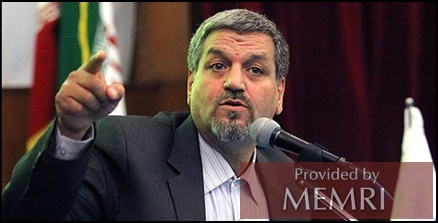
Mostafa Kawakibian (Source: Fars, July 21, 2019)
Iranian Cartoon Contest: "The Pirate Queen"
An entry by IRGC-affiliated cartoonist Mas'oud Shojai Tabatabai in a Tehran cartoon contest that began July 27 depicted the "pirate queen" – Elizabeth of England – being spanked with a tanker by an IRGC commander.

Source: Fars, July 27, 2019
Appendix
On May 6, 2019, MEMRI published Inquiry and Analysis No. 1452, How Will Iran Prevent The Export Of Oil From The Persian Gulf To World Markets?, in which IRGC Navy Commander Gen. Alireza Tangsiri, in a February 25, 2019 interview with Al-Alam TV, explained the Iranian perception that the Persian Gulf historically belongs to Iran and that Iran therefore controls it and monitors every vessel that enters it. He also clarified that Iran sees the foreign forces in the Persian Gulf as a threat and is therefore reinforcing its navy there. The following are the main points of his interview.[13]
First, Tangsiri explained that the navy of the Iranian Armed Forces and the IRGC Navy divide Iran's territorial waters between them: "In the Persian Gulf area, the Armed Forces' navy is present in the Gulf of Oman, from the Strait of Hormuz [eastwards] towards the Indian Ocean and the southern seas, whereas the IRGC Navy is in charge of the Persian Gulf [itself, west of] the Strait of Hormuz. We have 1,375 kilometers of maritime border with the waters of the Persian Gulf. In Hormozgan Province, there are 14 very important strategic islands; Bushehr Province has three, and Khuzestan has two important islands, at the mouth of the Khawr Musa strait.
"The Persian Gulf is a very important area, 250,000 square kilometers. The IRGC Navy has been placed in charge of this area, and is present on all its coasts and monitors every foreign presence in it. Outside this area, namely [along] the Gulf of Oman, the IRGC has two independent posts, one in Jask and the other in Chabahar...
"Iran is in charge of the lane leading into the Strait of Hormuz, and Oman, a friendly sister country, is in charge of the lane leading out of it... We have the longest coast along the Persian Gulf, and since antiquity it has been [known as] the Persian Gulf and has been associated with the Persians and with the Iranian state. It is a long coast that borders only the Islamic Republic of Iran. In the south, we border nine [different] countries, and that shows that this Gulf is the Persian Gulf. The countries across from us are Iraq, with a 75-km [border]; Kuwait, with a border of nearly 900 km, Saudi Arabia, Bahrain, Qatar, the UAE, and after that there is a border with part of Oman..."
Tangsiri: The IRGC Is Monitoring Every Vessel In The Region, We Maintain Full Intelligence Surveillance
"The IRGC is monitoring every vessel in the region, and [those] passing into the region entering via the Persian Gulf. We maintain full intelligence surveillance of them. When a foreign warship enters an [Iranian] military region, the Iranian Army monitors it in the Sea of Oman; in the Persian Gulf, the IRGC Navy monitors it from the moment it enters this closed gulf to the moment it exits.
"Foreigners in this region [i.e. in the Gulf waters]... bring nuclear warships and nuclear submarines into this closed gulf. This is very, very dangerous. America, Britain, France, and countries that have nuclear propulsion equipment bring their vessels into this region. If anything happens to them, there will not be a fish [in the Gulf] for 11 years; all the coral and all living creatures in the water will be destroyed. The presence of foreigners in this region is for us a potential danger..."
Asked whether the Iranian officials' threat to close the Strait of Hormuz in response to the U.S. intent to bring Iranian oil exports to zero could be actualized, Tangsiri said:
"We said [this] even before that. As long as our oil leaves the Strait of Hormuz, and there is no blockade on the exit and entrance of our vessels, this [threat] will not be actualized, and it is not logical that we would want to carry out such a mission. But if one day we feel that [other countries'] oil leaves here while ours does not, it is not logical that this should happen...
"Know that Iran's courageous young people will not permit this matter, and as long as we use the Strait of Hormuz and export our oil and there is no boycott against us, this strait will be open. But when they want to blockade our oil and our vessels... [they] will see that this will not happen...
"We are building submarines and warships and missile launching ships in the array of the Iranian army and the IRGC. [These] missile launchers have a top speed of over 60 knots. The submarine manufactured in Iran has added to the state's defensive capabilities. This capability is first and foremost defensive, but it is defensive [only] as long as we are not attacked and no problem for us is created. All this bears a single message, and that is that the Iranian Navy and the IRGC Navy are 100% prepared. Increasing this capability means, first, security in this sensitive region, and, second, defending Iran's borders...
"In the IRGC Navy, they believe that everything must remain concealed, and should be revealed bit by bit. What we see in the IRGC [Navy's] maneuvers is the very tip of this major capability, and you will see its main capability when [the enemies] feel the powerful blow...
"Those in this region reveal a tooth or a claw in some way every day. If someday they want to deviate from their border, we will break their teeth and claws...
"We are people who do not fear death. We see death as a way of defending the homeland – as martyrdom. We see death as joining God... No [other] place in the world has [this view]. Brave fighting forces that do not fear death, and a courageous and wise commander [i.e. Khamenei] who does not fear death or the reality of martyrdom – who wants to stand against him?"
Tangsiri: The Three Disputed Gulf Islands Are Iranian
Asked what the IRGC Navy's response was to the UAE's claim to sovereignty over the three disputed islands in the Gulf, Abu Moussa and Greater and Lesser Tunb, Tangsiri replied:
"These islands are Iranian. If we look back at history prior to 1976, they belonged to Iran... The islands are Iranian, and they must remain [so]. Just as we no longer have any claim [to sovereignty] over areas of Bahrain, no one can claim the Iranian islands..."
Tangsiri: "The Presence Of Foreigners In The Region Is A Threat To Us"
Tangsiri continued: "The presence of foreigners in the region is a threat to us, and we are always ready against this threat. [We] are conducting intelligence surveillance against them, and if they make a mistake, we will face them and strike them. As far as we are concerned, a foreigner in the region is meaningless. At this time, there is no enemy in this region; therefore, this enemy is outside the region, and is coming to this region for us... We are preparing every day in the Persian Gulf, and obtaining special equipment to protect the region that was given to us. We have planned and are ready [for an operation] beyond the Persian Gulf and the waters beyond our country...
"We are [situated] next to [our enemies] in the Persian Gulf, and surveilling them. We also maintain a determined presence outside the Persian Gulf. We are not anywhere – we are everywhere. This is our motto... and it means [that we] are present and they don't see [us] and this presence is permanent, with God's help."
[1] President.ir/fa/110569, July 28, 2019.
[2] President.ir/fa/110591, July 30, 2019.
[3] YJC (Iran), July 23, 2019.
[4] President.ir/fa/110480, July 24, 2019.
[5] Af.reuters.com/article/commoditiesNews/idAFL2N24N14O, July 22, 2019.
[6] Ebtekarnews.com, July 31, 2019.
[7] Farsnews.com, July 20, 2019.
[8] ISNA (Iran), July 23, 2019.
[9] Farsnews.com, July 21, 2019.
[10] Kayhan (Iran), July 21, 2019.
[11] Farsnews.com, July 20, 2019.
[12] Farsnews.com, July 20, 2019.
[13] Tasnimnews.com, February 25, 2019.




